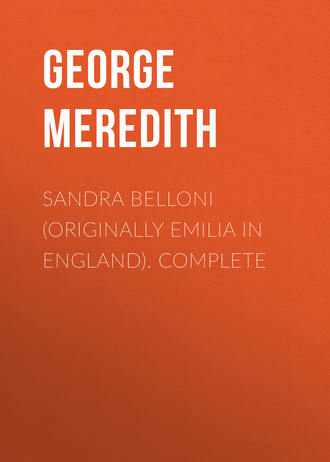
George Meredith
Sandra Belloni (originally Emilia in England). Complete
“Without sympathy,” she faltered, and was shocked at what she said; but it seemed a necessity.
“You must learn to conquer the need for it.”
Alas! his admonition only made her feel the need more cravingly.
“Promise me one thing,” he said. “You will not fall into the rut? Let me keep the ideal you have given me. For the sake of heaven, do not cloud for me the one bright image I hold! Let me know always that you are growing, and that the pure, noble intelligence which distinguishes you advances, and will not be subdued.”
Cornelia smiled faintly. “You have judged me too generously, Mr. Barrett.”
“Too little so! might I tell you!” He stopped short, and she felt the silence like a great wave sweeping over her.
They were nearing the lake, with the stump of the pollard-willow in sight, and toward it they went.
“I shall take the consolation of knowing that I shall hear of you, some day,” she said, having recourse to a look of cheerfulness.
He knew her to allude to certain hopes of fame. “I am getting wiser, I fear—too wise for ambition!”
“That is a fallacy, a sophism.”
He pointed to the hollow tree. “Is there promise of fruit from that?”
“You…you are young, Mr. Barrett.”
“And on a young, forehead it may be written, ‘Come not to gather more.’”
Cornelia put her hand out: “Oh, Mr. Barrett! unsay it!” The nakedness of her spirit stood forth in a stinging tear. “The words were cruel.”
“But, if they live, and are?”
“I feel that you must misjudge me. When I wrote them…you cannot know! The misery of our domestic life was so bitter! And yet, I have no excuse, none! I can only ask for pity.”
“And if you are wretched, must not I be? You pluck from me my last support. This, I petitioned Providence to hear from you—that you would be happy! I can have no comfort but in that.”
“Happy!” Cornelia murmured the word musically, as if to suck an irony from the sweetness of the sound. “Are we made for happiness?”
Mr. Barrett quoted the favourite sage, concluding: “But a brilliant home and high social duties bring consolation. I do acknowledge that an eminent station will not only be graced by you, but that you give the impression of being born to occupy it. It is your destiny.”
“A miserable destiny!”
It pleased Cornelia to become the wilful child who quarrels with its tutor’s teachings, upon this point.
Then Mr. Barrett said quickly: “Your heart is not in this union?”
“Can you ask? I have done my duty.”
“Have you, indeed!”
His tone was severe in the deliberation of its accents.
Was it her duty to live an incomplete life? He gave her a definition of personal duty, and shadowed out all her own ideas on the subject; seeming thus to speak terrible, unanswerable truth.
As one who changes the theme, he said: “I have forborne to revert to myself in our interviews; they were too divine for that. You will always remember that I have forborne much.”
“Yes!” She was willing at the instant to confess how much.
“And if I speak now, I shall not be misinterpreted?”
“You never would have been, by me.”
“Cornelia!”
Though she knew what was behind the door, this flinging of it open with her name startled the lady; and if he had faltered, it would not have been well for him. But, plainly, he claimed the right to call her by her Christian name. She admitted it; and thenceforward they were equals.
It was an odd story that he told of himself. She could not have repeated it to make it comprehensible. She drank at every sentence, getting no more from it than the gratification of her thirst. His father, at least, was a man of title, a baronet. What was meant by estates not entailed? What wild freak of fate put this noble young man in the power of an eccentric parent, who now caressed him, now made him an outcast? She heard of the sum that was his, coming from his dead mother to support him just one hundred pounds annual! Was ever fate so mournful?
Practically, she understood that if Mr. Barrett would write to his father, pledging himself to conform to his mysterious despotic will in something, he would be pardoned and reinstated.
He concluded: “Hitherto I have preferred poverty. You have taught me at what a cost! Is it too late?”
The fall of his voice, with the repetition of her name, seemed as if awakening her, but not in a land of reason.
“Why…why!” she whispered.
“Beloved?”
“Why did you not tell me this before?”
“Do you upbraid me?”
“Oh, no! Oh, never!” she felt his hand taking hers gently. “My friend,” she said, half in self-defence; and they, who had never kissed as lovers, kissed under the plea of friendship.
CHAPTER XXIII
All Wilfrid’s diplomacy was now brought into play to baffle Mr. Pericles, inspire Emilia with the spirit of secresy, and carry on his engagement to two women to their common satisfaction. Adela, whose penetration he dreaded most, he had removed by a flattering invitation to Stornley; and that Emilia might be occupied during his absences, and Mr. Pericles thrown on a false scent, he persuaded Tracy Runningbrook to come to Brookfield, and write libretti for Emilia’s operas. The two would sit down together for an hour, drawing wonderful precocious noses upon juvenile visages, when Emilia would sigh and say: “I can’t work!”—Tracy adding, with resignation: “I never can!” At first Mr. Pericles dogged them assiduously. After a little while he shrugged, remarking: “It is a nonsense.”
They were, however, perfectly serious about the production of an opera, Tracy furnishing verse to Emilia’s music. He wrote with extraordinary rapidity, but clung to graphic phrases, that were not always supple enough for nuptials with modulated notes. Then Emilia had to hit his sense of humour by giving the words as they came in the run of the song. “You make me crow, or I croak,” she said.
“The woman follows the man, and music fits to verse,” cried Tracy. “Music’s the vine, verse the tree.”
Emilia meditated. “Not if they grow up together,” she suggested, and broke into a smile at his rapture of amusement; which was succeeded by a dark perplexity, worthy of the present aspect of Mr. Pericles.
“That’s what has upset us,” he said. “We have been trying to ‘grow up together,’ like first-cousins, and nature forbids the banns. To-morrow you shall have half a libretto. And then, really, my child, you must adapt yourself to the words.”
“I will,” Emilia promised; “only, not if they’re like iron to the teeth.”
“My belief is,” said Tracy savagely, “that music’s a fashion, and as delusive a growth as Cobbett’s potatoes, which will go back to the deadly nightshade, just as music will go back to the tom-tom.”
“What have you called out when I sang to you!” Emilia reproached him for this irreverent nonsense.
“Oh! it was you and not the music,” he returned half-cajolingly, while he beat the tom-tom on air.
“Hark here!” cried Emilia. She recited a verse. “Doesn’t that sound dead? Now hark!” She sang the verse, and looked confidently for Tracy’s verdict at the close.
“What a girl that is!” He went about the house, raving of her to everybody, with sundry Gallic interjections; until Mrs. Chump said: “‘Deed, sir, ye don’t seem to have much idea of a woman’s feelin’s.”
Tracy produced in a night two sketches of libretti for Emilia to choose from—the Roman Clelia being one, and Camillus the other. Tracy praised either impartially, and was indifferent between them, he told her. Clelia offered the better theme for passionate song, but there was a winning political object and rebuff to be given to Radicalism in Camillus. “Think of Rome!” he said.
Emilia gave the vote for Camillus, beginning forthwith to hum, with visions of a long roll of swarthy cavalry, headed by a clear-eyed young chief, sunlight perching on his helm.
“Yes; but you don’t think of the situations in Clelia, and what I can do with her,” snapped Tracy. “I see a song there that would light up all London. Unfortunately, the sentiment’s dead Radical. It wouldn’t so much matter if we were certain to do Camillus as well; because one would act as a counterpoise to the other, you know. Well, follow your own fancy. Camillus is strictly classical. I treat opera there as Alfieri conceived tragedy. Clelia is modern style. Cast the die for Camillus, and let’s take horse. Only, we lose the love-business—exactly where I show my strength. Clelia in the camp of the king: dactyllic chorus-accompaniment, while she, in heavy voluptuous anapaests, confesses her love for the enemy of her country. Remember, this is our romantic opera, where we do what we like with History, and make up our minds for asses telling us to go home and read our ‘student’s Rome.’ Then that scene where she and the king dance the dactyls, and the anapaests go to the chorus. Sublime! Let’s go into the woods and begin. We might give the first song or two to-night. In composition, mind, always strike out your great scene, and work from it—don’t work up to it, or you’ve lost fire when you reach the point. That’s my method.”
They ran into the woods, skipping like schoolboy and schoolgirl. On hearing that Camillus would not be permitted to love other than his ungrateful country, Emilia’s conception of the Roman lord grew pale, and a controversy ensued-she maintaining that a great hero must love a woman; he declaring that a great hero might love a dozen, but that it was beneath the dignity of this drama to allow of a rival to Rome in Camillus’s love.
“He will not do for music,” said Emilia firmly, and was immoveable. In despair, Tracy proposed attaching a lanky barbarian daughter to Brennus, whose deeds of arms should provoke the admiration of the Roman.
“And so we relinquish Alfieri for Florian! There’s a sentimental burlesque at once!” the youth ejaculated, in gloom. “I chose this subject entirely to give you Rome for a theme.”
Emilia took his hand. “I do thank you. If Brennus has a daughter, why not let her be half Roman?”
Tracy fired out: “she’s a bony woman, with a brawny development; mammoth haunches, strong of the skeleton; cheek-bones, flat-forward, as a fish ‘s rotting on a beach; long scissor lips-nippers to any wretched rose of a kiss! a pugilist’s nose to the nostrils of a phoca; and eyes!—don’t you see them?—luminaries of pestilence; blotted yellow, like a tallow candle shining through a horny lantern.”
At this horrible forced-poetic portrait, Emilia cried in pain: “You hate her suddenly!”
“I loathe the creature—pah!” went Tracy.
“Why do you make her so hideous?” Emilia complained. “I feel myself hating her too. Look at me. Am I such a thing as that?”
“You!” Tracy was melted in a trice, and gave the motion of hugging, as a commentary on his private opinion.
“Can you also be sure that Camillus can love nothing but his country? Would one love stop the other?” she persisted, gazing with an air of steady anxiety for the answer.
“There isn’t a doubt about it,” said Tracy.
Emilia caught her face in her hands, and exclaimed in a stifling voice: “It’s true! it’s true!”
Tracy saw that her figure was shaken with sobs—unmistakeable, hard, sorrowful convulsions.
“Confound historical facts that make her cry!” he murmured to himself, in a fury at the Roman fables. “It’s no use comforting her with Niebuhr now. She’s got a live Camillus in her brain, and there he’ll stick.” Tracy began to mutter the emphatic D.; quite cognizant of her case, as he supposed. This intensity of human emotion about a dry faggot of history by no means surprised him; and he was as tender to the grief of his darling little friend as if he had known the conflict that tore her in two. Subsequently he related the incident, in a tone of tender delight, to Wilfrid, whom it smote. “Am I a brute?” asked the latter of the Intelligences in the seat of his consciousness, and they for the moment gravely affirmed it. I have observed that when young men obtain this mental confirmation of their suspicions, they wax less reluctant to act as brutes than when the doubt restrained them.
He reasoned thus: “I can bring my mind to the idea of losing her, if it must be so.” (Hear, hear! from the unanimous internal Parliament.) “But I can’t make her miserable (cheers)—I can’t go and break her heart” (loud cheers, drowning a faint dissentient hum).—The scene, of which Tracy had told him, gave Wilfrid a kind of dread of the girl. If that was her state of feeling upon a distant subject, how would it be when he applied the knife. Simply, impossible to use the knife at all! Wield it thou, O Circumstance, babe-munching Chronos, whosoever thou art, that jarrest our poor human music effectually from hour to hour!
Colonel Pierson paid his promised visit, on his way back to his quarters at Verona. His stay was shortened by rumours of anticipated troubles in Italy. One day at table he chanced to observe, speaking of the Milanese, that they required another lesson, and that it would save the shedding of blood if, annually, the chief men of the city took a flogging for the community (senseless arrogance that sensible, and even kindly, men will sometimes be tempted to utter, and prompted to act on, in that deteriorating state of a perpetual repressive force).—Emilia looked at him till she caught his eye: “I hope I shall never meet you there,” she said.
The colonel coloured, and drew his finger along each curve of his moustache. The table was silent. Colonel Pierson was a gentleman, but a false position and the irritating topic deprived him of proper self-command.
“What would you do?” he said, not gallantly.
Emilia would have been glad to have been allowed to subside, but the tone stung her.
“I could not do much; I am a woman,” said she.
Whereto the colonel: “It’s only the women who do anything over there.”
“And that is why you flog them!”
The colonel, seeing himself surrounded by ladies, lost the right guidance of his wits, at this point, reddened, and was saved by an Irish outcry of horror from some unpleasant and possibly unmanly retort. “Mr. Paricles said exactly the same. Oh, sir! do ye wear an officer’s uniform to go about behavin’ in that shockin’ way to poor helpless females?”
This was the first time Mrs. Chump had ever been found of service at the Brookfield dining-table. Colonel Pierson joined the current smile, and the matter passed.
He was affectionate with Wilfrid, and invited him to Verona, with the assurance that his (the Austrian) school of cavalry was the best in the world. “You beat us in pace and weight; but you can’t skirmish, you can’t manage squadrons, and you know nothing of outpost duty,” said the colonel. Wilfrid promised to visit him some day: a fact he denied to Emilia, when she charged him with it. Her brain seemed to be set on fire by the presence of an Austrian officer. The miserable belief that she had abandoned her country pressing on her remorsefully, she lost appetite, briskness of eye, and the soft reddish-brown ripe blood-hue that made her cheeks sweet to contemplate. She looked worn, small, wretched: her very walk indicated self-contempt. Wilfrid was keen to see the change for which others might have accused a temporary headache. Now that she appeared under this blight, it seemed easier to give her up; and his magnanimity being thus encouraged (I am not hard on him—remember the constitution of love, in which a heart un-aroused is pure selfishness, and a heart aroused heroic generosity; they being one heart to outer life)—his magnanimity, I say, being under this favourable sun, he said to himself that there should be an end of double-dealing; and, possibly consoled by feeling a martyr, he persuaded himself to act the gentle ruffian. To which end, he was again absent from Brookfield, for a space, and bitterly missed.
Emilia, for the last two Sundays, had taken Mr. Barrett’s place at the organ. She was playing the prelude to one of the evening hymns, when the lover, whose features she dreaded to be once more forgetting, appeared in the curtained enclosure. A stoppage in the tune, and a prolonged squeal of the instrument, gave the congregation below matter to speculate upon. Wilfrid put up his finger and sat reverently down, while Emilia plunged tremblingly at the note that was howling its life away. And as she managed to swim into the stream of the sacred melody again, her head was turned toward her lover under a new sensation; and the first words she murmured were, “We have never been in church together, before.”
“Not in the evening,” he whispered, likewise impressed.
“No,” said Emilia softly; flattered by his greater accuracy.
If Wilfrid could have been sure that he would be perfect master of that sentimental crew known to him under the denomination of his feelings, the place he selected for their parting interview might be held creditable to this young officer’s acknowledged strategical ability. It was a place where any fervid appeals were impossible; where he could contemplate her, listen to her, be near her, alone with her, having nothing to dread from tears, supplications, or passion, as a consequence of the short indulgence of his tenderness. But he had failed to reckon on the chances that he himself might prove weak and be betrayed by the crew for whose comfort he was always providing; and now, as she sat there, her face being sideways to him, the flush of delight faint on her cheek, and her eyelids half raised to the gilded pipes, while full and sonorous harmony rolled out from her touch, it seemed the very chorus of the heavens that she commanded, and a subtle misty glory descended upon her forehead, which he was long in perceiving to be cast from a moisture on his eyelids.
When the sermon commenced, Emilia quitted the organ and took his hand. In very low whispers, they spoke:
“I have wanted to see you so!”
“You see me now, little woman.”
“On Friday week next I am to go away.”
“Nonsense! You shall not.”
“Your sisters say, yes! Mr. Pericles has got my father’s consent, they say, to take me to Italy.”
“Do you think of going?”
Emilia gazed at her nerveless hands lying in her lap.
“You shall not go!” he breathed imperiously in her ear.
“Then you will marry me quite soon?” And Emilia looked as if she would be smiling April, at a word.
“My dear girl!” he had an air of caressing remonstrance.
“Because,” she continued, “if my father finds me out, I must go to Italy, or go to that life of torment in London—seeing those Jew-people—horrible!—or others and the thought of it is like being under the earth, tasting bitter gravel! I could almost bear it before you kissed me, my lover! It would kill me now. Say! say! Tell me we shall be together. I shudder all day and night, and feel frozen hands catching at me. I faint—my heart falls deep down, in the dark…I think I know what dying is now!”
She stopped on a tearless sob; and, at her fingers’ ends, Wilfrid felt the quivering of her frame.
“My darling!” he interjected. He wished to explain the situation to her, as he then conceived it. But he had, in his calculation, failed also to count on a peculiar nervous fretfulness, that the necessity to reiterate an explanation in whispers must superinduce. So, when Emilia looked vacant of the intelligence imparted to her, he began anew, and emphatically; and ere he was half through it, Mr. Marter, from the pulpit underneath, sent forth a significant reprimand to the conscience of a particular culprit of his congregation, in the form of a solemn cough. Emilia had to remain unenlightened, and she proceeded to build on her previous assumption; doing the whispering easily and sweetly; in the prettiest way from her tongue’s tip, with her chin lifted up; and sending the vowels on a prolonged hushed breath, that seemed to print them on the hearing far more distinctly than a volume of sound. Wilfrid fell back on monosyllables. He could not bring his mouth to utter flinty negatives, so it appeared that he assented; and then his better nature abused him for deluding her. He grew utterly ashamed of his aimless selfish double-dealing. “Can it be?” he questioned his own mind, and listened greedily to any mental confirmations of surpassing excellence in her, that the world might possibly acknowledge. Having, with great zeal, created a set of circumstances, he cursed them heartily, after the fashion of little people. He grew resigned to abandon Lady Charlotte, and to give his name to this subduing girl; but a comfortable quieting sensation came over him, at the thought that his filial duty stood in the way. His father, he knew, was anxious for him to marry into a noble family—incomprehensibly anxious to have the affair settled; and, as two or three scenes rose in his mind, Wilfrid perceived that the obstacle to his present fancy was his father.
As clearly as he could, with the dread of the preacher’s admonishing cough before him, Wilfrid stated the case to Emilia; saying that he loved her with his whole heart; but that the truth was, his father was not in a condition of health to bear contradiction to his wishes, and would, he was sure, be absolutely opposed to their union. He brought on himself another reprimand from Mr. Marter, in seeking to propitiate Emilia’s reason to comprehend the position rightly; and could add little more to the fact he had spoken, than that his father had other views, which it would require time to combat.
Emilia listened attentively, replying with a flying glance to the squeeze of his hand. He was astonished to see her so little disconcerted. But now the gradual fall of Mr. Marter’s voice gave them warning.
“My lover?” breathed Emilia, hurriedly and eagerly; questioning with eye and tone.
“My darling!” returned Wilfrid.
She sat down to the organ with a smile. He was careful to retreat before the conclusion of the service; somewhat chagrined by his success. That smile of hers was inexplicable to him.







